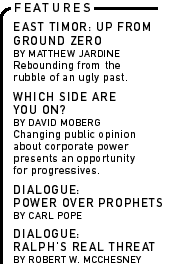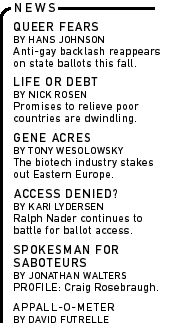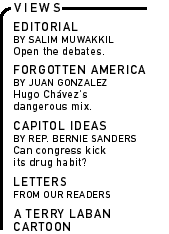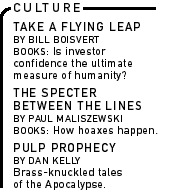 
|

|

|

|
| |
|
|
|
George W. Bush's ploy to change the format of the presidential debates was effective in one respect: It diverted attention from the much larger issue of opening the debates to third-party candidates. The Texas governor's tactic, combined with Ralph Nader's precipitous drop in the polls since the Democratic National Convention, has hushed discussion about debate participation. At the other end of the political spectrum, Patrick Buchanan's push to get into the debates was detoured by his inability to win outright the nomination of the Reform Party. In fact, his heavy-handed attempt to hijack the party that Ross Perot built has split the group into rancorous factions. One group backs Buchanan, while the other has thrown its support behind John Hagelin, a physicist and devotee of transcendental meditation, who also is the candidate of the Natural Law Party. Though badly crippled, Buchanan's presidential campaign nonetheless will be subsidized with public funds. He has been awarded the $12.6 million in public funds the party earned when Perot polled 8 percent of the vote in the 1996 elections. However, most of the paying public will not hear what the candidate has to say because he too is blocked from the debates. Nader and Buchanan are locked out of the debates because they have failed to attract at least 15 percent support as measured by the average of five media polls. (In recent polls, Nader is pulling 2 to 4 percent, while Buchanan is drawing 1 percent or less.) They also may lack ballot access in enough states to win the electoral college vote. These are two of the three criteria set for inclusion in the debates by the Commission on Presidential Debates. (The other is constitutional eligibility.) The purpose of the criteria, according to the commission, "is to identify those candidates who have achieved a level of electoral support such that they realistically are considered to be among the principal rivals for the Presidency." Of course, the 15 percent threshold effectively excludes just about any third-party candidate. But that shouldn't be surprising given the pedigree and structure of the commission. Although it claims to be a "nonpartisan, nonprofit corporation," the commission is deeply enmeshed in party politics. In fact, it is a creation of the Democratic and Republican national committees. While the commission boasts about not accepting money from government sources or political parties, it is sponsored by big corporations like AT&T, Sun Microsystems and Anheuser-Busch--which reportedly donated $550,000 to sponsor an October 17 debate in St. Louis. The corporate media is also complicit in this ruse. Rather than tagging the debate commission as a creature of the two-party duopoly, it perpetrates the fiction that the commission is truly nonpartisan. Networks and cable channels could refuse to cover the debates unless they were less exclusive, or they could host their own inclusive debates. History demonstrates that independent candidates stand little chance of attracting 15 percent of the vote without the exposure of national debates. Minnesota Gov. Jesse Ventura is often cited as an example of a winner who polled in single digits before debating the major candidates. Another Jesse, Rep. Jesse Jackson Jr. (D-Illinois), has introduced a resolution to include candidates in the presidential debates if they attract 5 percent in the polls, or if a majority of voters support the candidates' participation. (In a July Fox News poll, 64 percent of respondents said Nader and Buchanan should be included.) Several organizations are planning to protest the closed debates, with major actions planned for the first debate on October 3 in Boston as well as in St. Louis. Certainly there is a need to protect presidential debates from
frivolous distractions, but serious candidates like Ralph Nader
and Patrick Buchanan deserve to be heard. Who knows? It might start
a trend that allows voters to choose between more than lesser evils.
|

